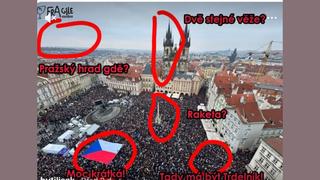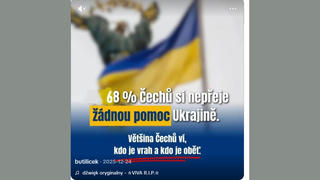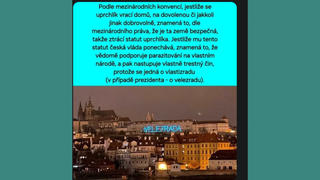
Does the fact that Ukraine exports agricultural products mean that the country is not affected by the war and its people and refugees do not need help? No, that's not true: The impact of the Russian invasion on Ukrainian agriculture was detrimental especially at the beginning. Meanwhile, the country has managed, with the help of the international community, to partially restore its exports, which are vital for global food security.
The claim appeared in a video (archived here) where it was published by TikTok on Aug.9, 2023. It has a Czech caption translated by Lead Stories as:
A country that is at war exports food products to us? Why did we have food aids for the country? Something is wrong here.
This is what the post looked like on TikTok at the time of writing:
(Source: TikTok screenshot taken on Tue Sep 12 10:33:53 2023 UTC)
Ukraine used to be a major producer of agricultural products, especially grains, that are exported to the developing countries. Keeping the exports flowing is key to global food security. The Russian invasion has exacerbated the global food crisis.
The EU helped to open so-called solidarity lanes, which ensured the overland transport of agricultural goods from Ukraine. The UN and Turkey brokered a deal with Russia, the Black Sea Grain Initiative in July 2022, opening safe, humanitarian corridors for shipping products. A year later, in July, 2023, Russia decided to withdraw from the deal, prompting criticism and calls from the international community to rejoin the initiative. The International Rescue Committee called the grain deal a "lifeline for the 79 countries and 349 million people on the front lines of food security."
Ukraine itself has suffered huge damages caused by Russian bombing campaigns. The cost of reconstruction and recovery for Ukraine as of Feb. 24, 2023, a year after the invasion begun, totaled to USD 411 billion according to the joint report of the World Bank, the Ukrainian government, the UN and the European Commission. The report notes that the direct damage to buildings and infrastructure amounted to USD 135 billion, from which agriculture accounts 6 percent. As Ukrainian farmers' export costs skyrocketed due to war-related obstacles, many farmers were on the edge of bankruptcy, according to a research published by the International Food Policy Research Institute.
Some of the Ukrainian wheat, which was primarily intended for developing countries, ended up in the Czech Republic. In 2022 it was less than 0.1 percent of the total Czech local production, according to the Czech Agriculture Ministry.
Right after the Russian invasion started on Feb. 24, 2022, Czech businesses and charities have held a number of food donations for Ukraine. The food donations were mainly intended for refugees who came in high numbers to the Czech Republic. But some were also shipped to Ukraine. People in Need, a Prague-based non-governmental organization, said it shipped some food aid to Ukraine at the beginning of the war. But since the country has a functioning food market, it switched to buying food for aid in Ukraine itself, the NGO's spokeswoman, Milada Vachova, told Lead Stories in an email. Currently, the organization provides only drinking water for some areas, but supplies are also bought in Ukraine, she said.
The Czech Federation of Food Banks, an umbrella organization of 15 local Czech food banks, also held food charities for refugees at the time, spokeswoman Vendula Seifertova told Lead Stories by phone. The volunteers who helped during a bi-annual food donation event in May, 2023 encountered anti-Ukrainian comments, although it was not focused on Ukrainian refugees only, Seifertova said.








